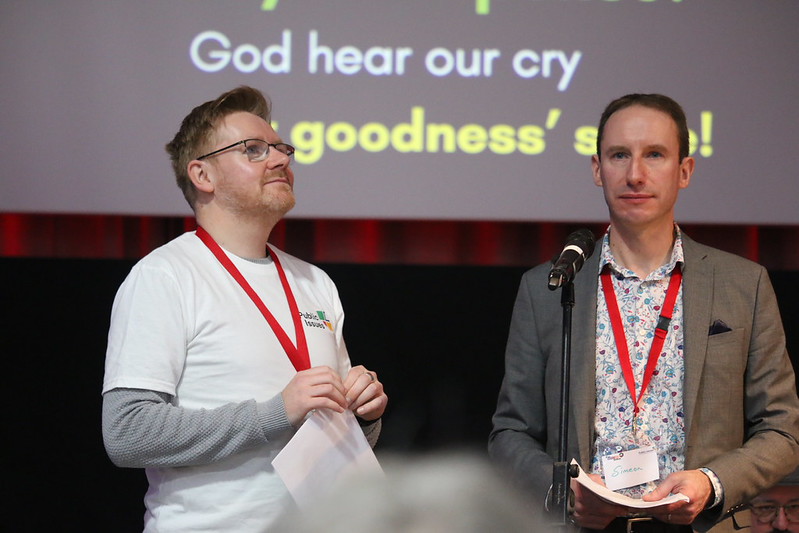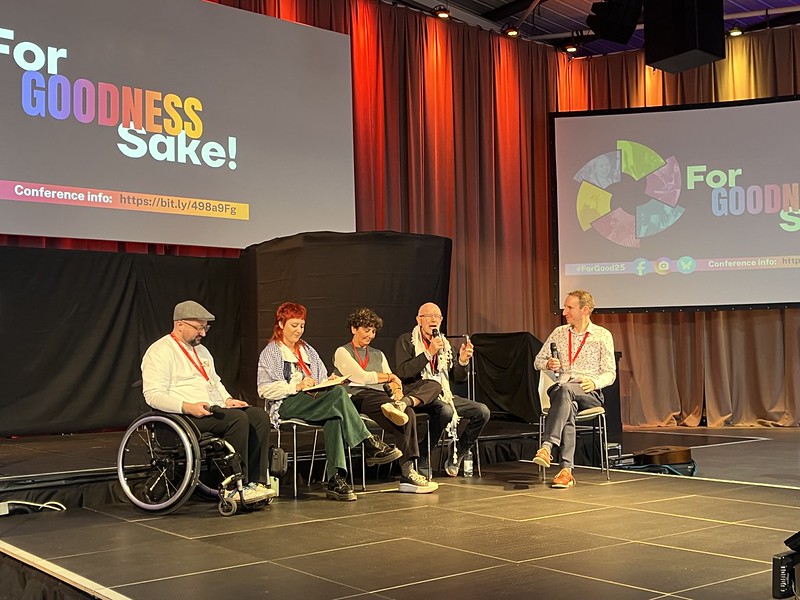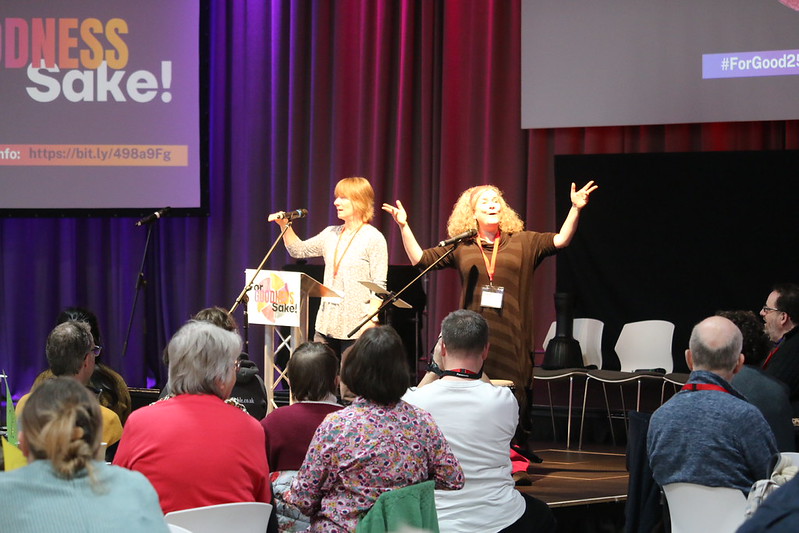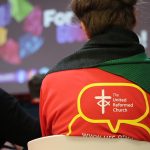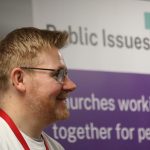Nearly 250 justice seekers gathered at the Joint Public Issues Team’s (JPIT) 2025 conference held at the Reach Conference Centre in Derby on 8 November.
With keynotes, listening spaces, workshops, crafts, and a range of stalls there was much for people to engage with and be inspired by.
Simeon Mitchell, JPIT Team Leader, opened the event by asking how often do we find ourselves thinking or shouting the event’s theme, “For Goodness Sake!”
“For goodness sake,” he exclaimed, “when will the violence end? For goodness sake, there’s no negotiation with an overheating planet. For goodness sake, how hard can it be for a Labour government to realise that a two-child benefit cap is wrong? For goodness sake, why does politics have to be like this? For goodness sake, why are you taking out your anger on the most vulnerable and powerless? For goodness sake, why? For goodness sake, what can I do for goodness’ sake?
“It feels like it can be a hard time to be a justice seeker and a follower of Christ at the moment,” he added. “But when has it ever been easy? I’m reminded of a verse from Psalm 23, ‘surely goodness and mercy should follow all the days of my life, and I shall dwell in the house of the lord’.”
Joined on stage by Roo Stewart, URC Head of Public Issues, Simeon, assisted members of the Iona Community’s Wild Goose Resource Group, in leading the conference in worship.
The first keynote of the day was delivered by the Right Revd Sally Foster-Fulton, a Church of Scotland Minister who also serves as Christian Aid’s UK and Global Church Ambassador.
Addressing the question “What is ours to do?” Sally delivered a spiritual and moral reflection on how people of faith can act justly, love kindly, and walk humbly amid a world marked by injustice, division, and apathy. Blending scripture, storytelling, and family wisdom, Sally called on the audience to “remember who you are”, a call to integrity and compassion even when it’s difficult or unpopular.
Opening her reflection, Sally spoke about the complexities of our most precious resource, time: how quickly or dragging it can pass; how we often complain that there’s never enough hours in the day, or that there’s too much of it on our hands. Sally’s message came through strong: whether we have lots of time or too little, what matters most important is what we do with it.
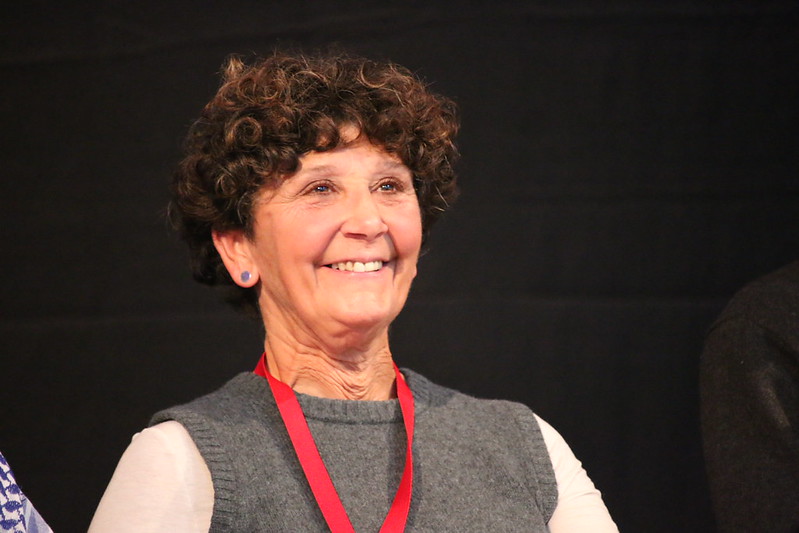
“What is ours to do,” answered Sally, “is to listen and learn from the margins. That as the body of Christ we can offer spaces that foster positive dialogue, thought our churches, to help dial down anger and instead provide opportunities to listen. What is ours to do, is offer love and compassion.”
Drawing on Christian Aid’s model — combining humanitarian aid, sustainable development, and advocacy — Sally emphasised the importance of staying engaged, maintaining a presence by “not leaving,” and working collaboratively toward justice. In this way, conference was inspired to live out faith as a present reality, not as a distant promise.
Sally ended her talk by inviting the audience to join her in singing a rendition of Kathy Galloway’s hymn Bread of Tomorrow which echoed her talk’s themes of hope and shared responsibility.
Watch Sally’s talk:
Attendees then enjoyed a range of conversation spaces that explored topics such as: politics with Catherine Atkinson MP for Derby North; Welcome Churches, a charity which encourages churches to welcome refugees in their communities; Church Action on Poverty, Gaza and the West Bank, environment, and the rise of the far right and Christian nationalism.
The conference then reconvened in the main hall to hear a keynote, delivered by the Right Revd Dr Guli Francis-Dehqani, Bishop of Chelmsford.
Bishop Guli opened her address with words from Jeremiah 6:16: “Stand at the crossroads and look; ask for the ancient paths, where the good way lies; walk in it and find rest for your souls.”
She reflected on how this call to “choose the good way” remains urgent today, even when the right path is unclear or when Christians must choose between two imperfect options. The challenge, she said, is to seek goodness amid anxiety, fear, and division, both in society and within the Church itself.
Public ministry, she noted, often forces people into false binaries: right or wrong, good or bad, with or against, leaving little space for nuance or grace. Yet Christian witness demands that we resist this polarisation by occupying the “difficult space between extremes,” and called on us to instead show humility, empathy, and patience even when this is costly.
To remain rooted in the “good way,” Guli emphasised the importance of daily prayer, silence, and spiritual reflection. These disciplines, she said, help us surrender what we cannot control, and helps us acknowledge our frailty and avoid being overwhelmed by evil.
Recalling her appearance before a Parliamentary Select Committee to defend the Church’s work with refugees and asylum seekers, Bishop Guli described it as a “moment to resist evil.”
Acknowledging the Church’s declining influence, Bishop Guli said Christians now speak from the margins rather than the centre of public life, and that this might not necessarily be a bad thing.
“Perhaps the Church was always intended to be small and marginal,” she suggested.
She argued that Christianity’s true nature — self-giving, humble, and rooted in service — often thrives when it is weak and loses sight when it grows powerful. From the margins, Bishop Guli explained, the Church can “rediscover its prophetic voice and resist conforming to worldly measures of success”.
Guli warned against the Church’s obsession with numbers, influence, and growth, which can distract from its primary calling to love and serve.
“There is nothing wrong with being small,” she said, “as long as we are faithful.” God, she reminded, “works through mustard seeds, widow’s mites, and hidden treasures”.
“In God’s economy,” she said, “nothing is wasted.”
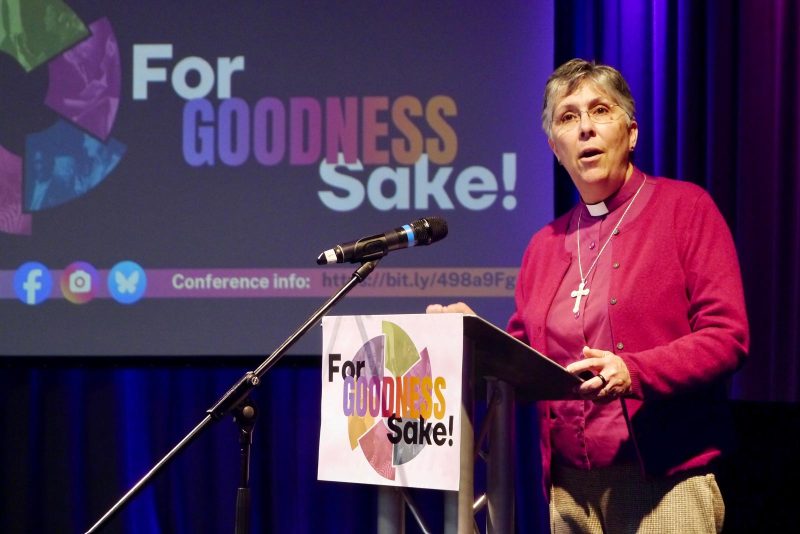
Concluding her talk, Bishop Guli explained that “faithful witness” is not only a personal journey but a collective one, shaped by worship, story, and service.
“The Church’s credibility in the public square depends not on words but on lived action: foodbanks, befriending refugees, caring for the elderly, and embodying love in everyday life.”
Referring to Stanley Hauerwas, an American Protestant theologian, ethicist, and intellectual, Guli explained that “true witness is shown in the fruits of the Spirit: compassion, service, and humility rather than through numbers or influence. Like the disciples on the road to Emmaus, Christians find Christ in the stranger and the shared meal; learning to be both hosts and guests in God’s world”.
To “hold on to the good” is to walk faithfully amid uncertainty yet grounded in prayer, humility, and community; open to voices from the margins; and unafraid to witness from the shadows, Guli explained further.
“It is to love God and neighbour not through power or prestige, but through faithful presence, hopeful service, and trust in God’s redemptive timing”.
Watch Bishop Guli’s talk:
Following the afternoon’s keynote, people were offered a range of workshops to skill up and share knowledge. Themes included: reframing narratives as a tool for change, using money for good, why social action and social justice must go hand-in-hand, making an impact through JPIT’s Constituency Action Network, Just Worship, and theology and activism.
The conference closed with lively worship and prayer.
Watch highlights of the conference on JPIT’s YouTube channel.


